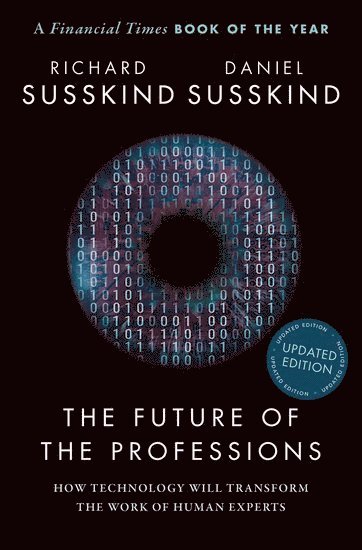
- Format
- Häftad (Paperback)
- Språk
- Engelska
- Antal sidor
- 592
- Utgivningsdatum
- 2022-05-03
- Upplaga
- Updated Edition
- Förlag
- OUP Oxford
- Medarbetare
- Susskind, Daniel
- Dimensioner
- 196 x 129 x 38 mm
- Vikt
- Antal komponenter
- 1
- ISBN
- 9780198841890
- 459 g
The Future of the Professions
How Technology Will Transform the Work of Human Experts, Updated Edition
- Skickas från oss inom 2-5 vardagar.
- Fri frakt över 249 kr för privatkunder i Sverige.
Passar bra ihop
De som köpt den här boken har ofta också köpt Organization Theory & Design av Hugh Willmott (häftad).
Köp båda 2 för 996 krKundrecensioner
Fler böcker av Richard Susskind
-
Tomorrow's Lawyers
Richard Susskind
-
Online Courts and the Future of Justice
Richard Susskind
-
The Future of Law
Richard Susskind
-
Transforming the Law
Richard Susskind
Recensioner i media
Phillip Taylor MBE and Elizabeth Taylor of Richard Green Chambers Review from previous edition Perhaps the forthcoming tidal wave of technology set to engulf us all will throw up new opportunities for the legal profession which is probably why just about every lawyer in London, so we are told, has bought a copy of this challenging, provocative, timely and important book. If you care about the future of your profession and wish to add further comment to the raging controversies surrounding it, better get yourself a copy now.
Richard Waters, Financial Times In The Future of the Professions, father-and-son authors Richard and Daniel Susskind do a remorselessly effective job of demolishing the self-deception most people engage in when comparing themselves to machines.
The Economist The authors are undoubtedly right that the professions will change more in the next quarter-century than they have in the previous three.
Tom Watson, The Guardian Remarkable work.
Giles Wilkes, Prospect This is a bold book ... The Future of the Professions helps us to recognise the professions' current methods as convoluted, self-serving rituals designed to wrap simple tasks in mystique.
David Pannick, The Times The Future of the Professions is a paradox that only a human mind could appreciate: the inevitable death of the professions is presented in an expert, original and witty work by two professionals whose skills (in thinking, writing and consultancy) are unlikely any time soon to be replicated by a machine.
Dan Pinnington, Slaw The Future of the Professions: How Technology Will Transform the Work of Human Experts, is a must read for anyone who wants to gain insights into where the legal profession is going ... Nothing else I have read more clearly and convincingly elucidates the future of legal services and how technology will transform the traditional practice of law.
Prospect Magazine An act of delicious iconoclasm.
Chris Yapp, Future Tech Blog Both a good read and a good starter for strategic planning in professional firms
Dan Bindman, Legal Futures I suggest that everyone who considers themselves 'professional' reads this book, especially those who are aged, say, 20-45, who need to secure their role in the new world of work. The authors predict that "our professions will be dismantled incrementally". If they are right, todays lawyers need to prepare for it, and the sooner the better.
Medium A fascinating and challenging book.
Network Review The study is exceptionally well informed and important contribution to thinking about the future of professional work
Law Skills As the saying is, the future is now and we ignore it at our peril. Please read this book.
Jeremy Hopkins, Future of Law The book is written in a relaxed, flowing and easily-consumable style ... a read of The Future of the Professions is time very well-spent.
Lord Thomas of Cwmgiedd, the Lord Chief Justi...
Övrig information
Professor Richard Susskind OBE is an author, speaker, and independent adviser to international professional firms and national governments. He is President of the Society for Computers and Law, IT Adviser to the Lord Chief Justice of England, and Chair of the Advisory Board of the Oxford Internet Institute. His numerous books include the best-sellers iThe End of Lawyers?: Rethinking the nature of legal services (OUP, 2008) and Tomorrow's Lawyers: An Introduction to Your Future (OUP, 2013). His work has been translated into more than 10 languages, and he has been invited to speak in over 40 countries. He was educated at the University of Glasgow and Balliol College, Oxford. Daniel Susskind is a Fellow of Balliol College, Oxford, from where he has two degrees in economics. Previously, he worked for the British Government - in the Prime Minister's Strategy Unit, in the Policy Unit in 10 Downing Street, and as a Senior Policy Adviser at the Cabinet Office. He was a Kennedy Scholar at Harvard University.
Innehållsförteckning
Preface to the Updated Edition Introduction I: Change 1: The Grand Bargain 2: From the Vanguard 3: Patterns Across the Professions II: Theory 4: Information and Technology 5: Production and Distribution of Knowledge III: Implications 6: Objections and Anxieties 7: After the Professions Conclusion: What Future Should We Want?
Du kanske gillar
-
Chip War
Chris Miller
Häftad -
Calculus
Robert A Adams
Inbunden


